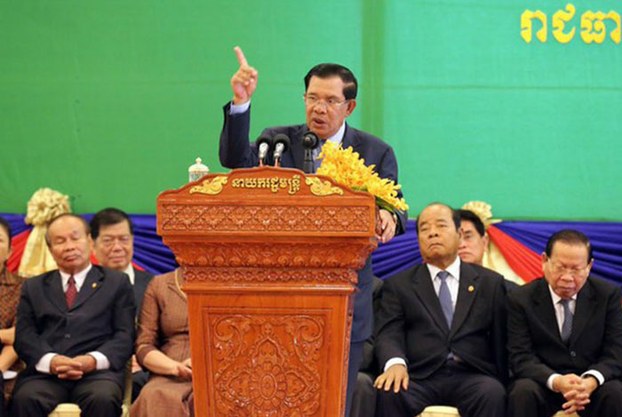Cambodia's Hun Sen rejects K5 project accusations
| Publisher | Radio Free Asia |
| Publication Date | 2 February 2017 |
| Cite as | Radio Free Asia, Cambodia's Hun Sen rejects K5 project accusations, 2 February 2017, available at: https://www.refworld.org/docid/58f9caa6a.html [accessed 20 May 2023] |
| Disclaimer | This is not a UNHCR publication. UNHCR is not responsible for, nor does it necessarily endorse, its content. Any views expressed are solely those of the author or publisher and do not necessarily reflect those of UNHCR, the United Nations or its Member States. |
2017-02-02
 Prime Minister Hun Sen speaking during a graduation ceremony at the Royal University of Phnom Penh, March 17, 2016. RFA/Brach Chev
Prime Minister Hun Sen speaking during a graduation ceremony at the Royal University of Phnom Penh, March 17, 2016. RFA/Brach Chev
Cambodian Prime Minister Hun Sen lashed out at his political rivals on Thursday as he defended a failed plan to secure the country's border after the 1979 fall of the Khmer Rouge.
Known as K5, the plan has been described as an attempt to build a kind of "Berlin Wall" on the Thai border in an effort to prevent the Pol Pot-led Khmer Rouge and other guerillas from reestablishing their bases and infiltrating Cambodia after their defeat by the Vietnamese in the late 1970s.
"The K5 Plan was conceived as a plan to defend the nation by preventing the return of the genocidal Pol Pot regime," Hun Sen said in a speech at a commencement exercise.
"It should have been you guys that are held responsible for the tragedy of the Cambodian people," he added in a reference to his political opposition.
While K5 was never completed, it's estimated that up to a million Cambodian workers were pressed into duty as slave laborers to clear the land for the proposed fortifications.
Thousands of Cambodians and ethnic Chinese died from disease or were killed or disabled by land mines as they labored on the ill-conceived project, which was bedeviled by corruption and mismanagement.
Hun Sen's own previous involvement with the Khmer Rouge is clouded in secrecy, and his relationship with Vietnam has become a potent political issue as the opposition has attempted to paint him as Hanoi's stooge.
With K5, the Vietnamese military command in Cambodia began hacking a path through the jungle along the border with the intent to mine and fortify the border in 1984.
At the time Hun Sen was a rising figure in the Vietnamese-installed government that ruled the country. In early 1985 he was elevated to the post of prime minister.
The late Sin Sen, who was Deputy Interior Minister for the People's Republic of Kampuchea – as the country was known at the time – has said that Hun Sen ran the operation.
"K5 was led by Hun Sen. He was assigned the responsibility by Vietnam," Sin Sen said according to the 2015 report "30 Years of Hun Sen" written by the London-based investigative nongovernmental organization Human Rights Watch.
'Khmer hands' to kill Cambodians
Cambodia National Rescue Party (CNRP) chief Sam Rainsy raised the issue anew in recent posts on his Facebook page.
In a Jan. 27 post, Sam Rainsy described K5 as a Vietnamese strategy to continue killing Cambodians in the post-Khmer Rouge regime.
According to the Facebook post, Vietnam "continued to borrow Khmer hands to kill one another" by changing the leadership in Cambodia when it installed Hun Sen as prime minister.
"They sue me for trivial accusations related to recent political events or controversies, but they don't dare sue me when I accuse them of being involved in crimes against humanity, because they cannot deny the historical facts," he wrote in a Jan. 31 Facebook post.
Sam Rainsy has been living in France since 2015 to avoid arrest in a defamation case brought by former Foreign Minister Hor Namhong in 2008.
In September, Sam Rainsy was found guilty of defamation for claiming that Hun Sen's social medial team had bought "likes" on Facebook from "click farms" abroad to increase the appearance of support.
In October, Hun Sen ordered police, immigration, and aviation authorities to "use all ways and means" to prevent the opposition leader from returning to the country, as Sam Rainsy has pledged to do before the country's elections.
And in December, Sam Rainsy was sentenced to five years in prison in absentia for posting what authorities said was a fake government pledge to dissolve the Southeast Asian country's border with Vietnam.
Local elections in Cambodia are set for later this year, with national elections scheduled for 2018.
In his speech on Thursday, Hun Sen defended his actions and attempted to turn the tables on his rivals as he blamed them for aligning with the Khmer Rouge.
"Why did you make an alliance with the Khmer Rouge when they tried to destroy the revival of the Cambodian people?" he asked rhetorically.
"I just defended [the country] against the return of the Pol Pot regime, and there was nothing wrong with that."
Reported by Thai Tha for RFA's Khmer Service. Translated by Sovannrith Keo. Written in English by Brooks Boliek.
Link to original story on RFA website
